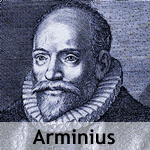Biographies
This page was written by Jess Hoare, an A level student at the Arnewood School, 2007.
Hard Determinists
Compatibilists
- Hobbes
Libertarians
- Arminius
Clarence Darrow was born 18 April 1857 in Kinsman, Ohio and died 13 March 1938. Darrow grew up in Ohio and started to practise law in 1878. He then settled in Chicago and became a lawyer. Darrow was most known for his oratorical skills and quick wit which made him famous in and out of the court room. He was a hero in intellectual circles for his progressive politics. Essentially Darrow argued that what we do, and the way we are, ultimately comes down to luck. We are responsible neither for our heredity nor for our environment, yet these factors taken together determine both the hand we’re dealt—our character—and perhaps more importantly, the waywe play our hand: the choices we make, the acts we perform, the very thoughts that run through our heads. A terrible crime, then, should be viewed like the effects of a hurricane or an earthquake. There is no one to blame but nature (and nurture) itself. Darrow pleaded the innocence of his clients, Leopold and Loeb, by invoking such a notion of hard determinism. During his summation, he declared:
What has this boy to do with it? He was not his own father; he was not his own mother; he was not his own grandparents. All of this was handed to him. He did not surround himself with governesses and wealth. He did not make himself. And yet he is to be compelled to pay.
He retired from regular practise in 1927 to devote his time to lecturing law, social issues and religion.
John Broadus Watson was born January 9, 1878 and raised in Greenville, South Carolina. He is an American psychologist who established the psychological school of behaviourism, after doing research on animal behaviour.
He attended Furman University. Watson entered college at 16 and left 5 years later at 21 with a masters degree. He then spent a year teaching and after that attended the University of Chicago to study philosophy. It was the combined influence of James Rowland Angell, Henry Donaldson and Jacques Loeb, who he met at Chicago University that led Watson to develop a highly descriptive, objective approach to the analysis of behaviour that he would later call ‘behaviourism’. Watson then died 25 September,1958.
B.F Skinner was born on March 20,1904 in Susquehanna, a small town in Pennsylvania. His father was a lawyer and his mother a house wife. B.F. Skinner was an American psychologist who was the primary proponent of the school of behaviorist psychology. According to Skinner and the theory of behaviorism, human behavior can best be explained as responses to specific external stimuli. He later died of leukemia in August 1990.
John Calvin was born Jean Chauvin in Noyon, Picardie in France. Calvin’s father sent his son to the University of Paris when he was only 14, where he studied humanities and law. By 1532 he had attained a Doctor of law degree. In 1536 he settled in Geneva, Switzerland. He was then expelled from the city and moved to Strasbourg where he served as a pastor in Strasbourg from 1538 to 1541. After attaining his degree Calvin started to look for a wife. In 1939 he married Idelette de Bure. Calvin’s health started to deteriorate due to migraines, lung haemorrhages, gout and kidney stones. John Calvin died in Geneva on May 27, 1564.
Benedictus de Spinoza was a Dutch philosopher born on November 24, 1632. Benedict de Spinoza is a great Dutch philosopher who was raised in the Jewish community in Holland. He was enormously influenced by Jewish medieval philosophy and the philosophies of Hobbes and Descartes. Compatibilists maintain that determinism is compatible with free will. A common strategy employed by ‘classical compatibilists’. To claim that a person acts freely only when the person willed the act and the person could have done otherwise, if the person had decided to.

